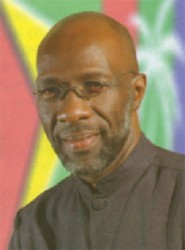The Ramotar administration would likely want to pre-empt the opposition’s vote of no-confidence against it, according to former PNCR insider and elections commissioner, Vincent Alexander.
Speaking to Stabroek News on Thursday, Alexander said the unlikelihood of the AFC’s no-confidence motion against government being passed before Parliament emerges from its recess in October provides an opportunity for the government, pre-emptively, to call early elections.
The prospect of a no-confidence motion against the Ramotar administration has been gaining traction in recent weeks and was solidified by the Alliance for Change’s (AFC) formal presentation of the motion on Thursday to the Clerk of the National Assembly. Prior to this, the main opposition coalition, A Partnership for National Unity (APNU), on Tuesday, signalled its intention to support the motion once it is laid. This was the cinch since all together the two opposition groups hold a one-seat majority in parliament.

Alexander is of the opinion that the opposition parties will make no move to have a sitting before the recess ends as it is likely they will want to use the two-month period to deliberate on strategy. He added that the opposition parties may have members out of the country and are not at full strength, which will be needed to get the motion passed. Since the presentation of the motion, the AFC has signalled that it will await the end of the recess to proceed with it.
On the other hand, Alexander also believes the time-lapse between August 10th and October 10th presents an opportunity for government to pre-empt what now appears to be an imminent no-confidence motion against it.
During the interview on Thursday, Alexander noted that a no-confidence motion has never been laid, let alone passed, against any Government of Guyana in the country’s history. He wagered that the Ramotar administration does not want a no-confidence motion on its record, and is of the opinion that Cabinet may decide to call early elections once it is sure the opposition parties plan to go through with the confidence motion. If this is done, he says, the no-confidence motion will be rendered irrelevant.
General Secretary of the PPP, Clement Rohee at a party press conference on Monday acknowledged the option of the government calling elections on its own terms.
Article 106 (6) of Guyana’s constitution says that “The Cabinet including the President shall resign if the Government is defeated by the vote of a majority of all the elected members of the National Assembly on a vote of confidence.”
Article 106 (7) goes on to say: “Notwithstanding its defeat, the Government shall remain in office and shall hold an election within three months, or such longer period as the National Assembly shall by resolution supported by not less than two-thirds of the votes of all the elected members of the National Assembly determine, and shall resign after the President takes the oath of office following the election.”
Possible outcomes
A successful no-confidence motion against government may have several outcomes says Alexander, Political Analyst Christopher Ram and former House Speaker Ralph Ramkarran.
Ram pointed out that early elections can see the maintenance of the status quo; the return of a PPP/C majority in the National Assembly; a decrease in the PPP/C’s plurality; or “the APNU (assuming it is held together) winning a plurality, or remotely, a majority.” He said that in any of the above-mentioned outcomes “the AFC can enjoy a bigger/smaller share of the votes and there may be one or two new parties also joining the electoral race and hoping for a slice of the pie.”
He believes that “if the PPP/C were to regain the majority, democracy may face additional stresses. The Government’s abuse of the Constitution will worsen,” he said, while adding that “the mortgage of the country to foreign interests will accelerate.”
If the elections maintains the status quo though, Ram offered, “That may not be a bad outcome as it may just convince everyone that the apology we have for a Constitution must finally be changed.”
“In a polarized society as Guyana, winner-take-all politics is unworkable and destructive. The PPP/C may just come around to this reality if it fails to regain a majority,” Ram elaborated. Ramkarran offered a more optimistic outlook. He speculated that if the PPP/C regains the majority, or retains the plurality the party may become more receptive to the idea of a coalition government. He believes the PPP/C would want to consider that it has not been able to convince the opposition parties to support major projects and has therefore, since the 2011 elections, encountered overwhelming difficulties implementing the policies on its agenda.
Alexander also believes that government will be forced to embrace shared governance if it again fails to secure more than a plurality. If the PPP/C refuses, Alexander said, it will continue to see its agenda stymied by the opposition parties.
Ram did note though, that it is possible that it may be business as usual if the PPP/C returns with the plurality, and a return to pre-2011 conditions if it wins the majority.





